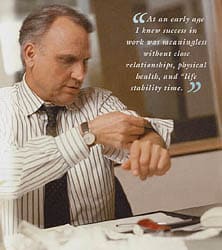Overwhelmed, overextended, overtired, understaffed, under appreciated, under-mined. . .these words all conjure up images of stress. Stress is not a middle-of-the-road situation. It lives on the fringes, it’s over-this or under-that. No one wants to be overworked or underpaid. Put the two together in the same sentence and the pressure increases. The 21st Century question many of us are facing is “How can we design our lives so we have the edge of achievement, but don’t alienate our families and health to get there?” Generally people don’t study how to handle stress unless they “have to”. For most of us it is health-related problems that force this issue. Heart attack victims are classic examples of people who change once they see the impact high-pressure, a.k.a. high blood pressure, creates on the body. Experts predict 80% of all illness is stress related. My “have to” time came early in life. A recent college grad, I was working hard to impress my bosses and make a way for myself in San Diego. Being born and raised in Michigan I didn’t have the advantage of college connections or family influence when I moved west.
I worked as a catering manager at a large university and within two years quadrupled the sales into a million-dollar operation. I worked 15-hour days, six and seven days a week, supervis- ing a staff of 10. When I left the position, they replaced me with three people. I burned out at the age of 28.1 had chronic asthma, chronic fatigue and, nearing 200 pounds for my five foot three inch frame, I had chronic desperateness. I was a success in work, a failure in life. Excessive caffeine, nicotine, alcohol and high fat sugary foods were the way I fueled my body for this rigorous regime. Aware that my body was in need of an over- haul, I plugged my overachiever efforts into self- healing, nutrition and finding inner peace (what- ever that was). Finding an inner/outer balance became my mission.
I wanted to be a success in my work and my personal life. At an early age I knew success in work was meaning-less without close relationships, physical health and “life stability time.” What is life stability time? It is time set aside when we review the foundations of what matters most in our lives and a check-in time with our- selves to review our progress. Sometimes it is scholarly with our calendars setting goals. Another time it is a pampering retreat with deep relaxation to slow down the pace or maybe pick up the pace with an athletic pursuit to keep the body func- tioning at its peak. The purpose is to recap, realign and restore. The results are enthusiasm and vitality for your life. One of the fathers of time management, Charles Hobbs said, “If you determine what you do best and set some relevant goals that you focus on.. .accomplishment will be yours.”


